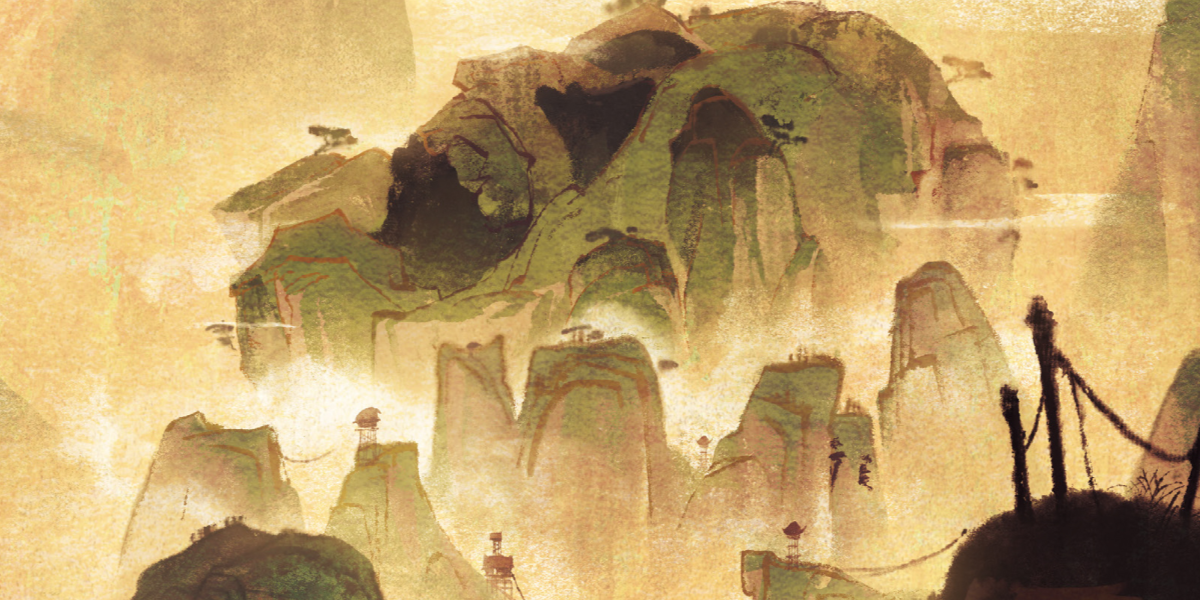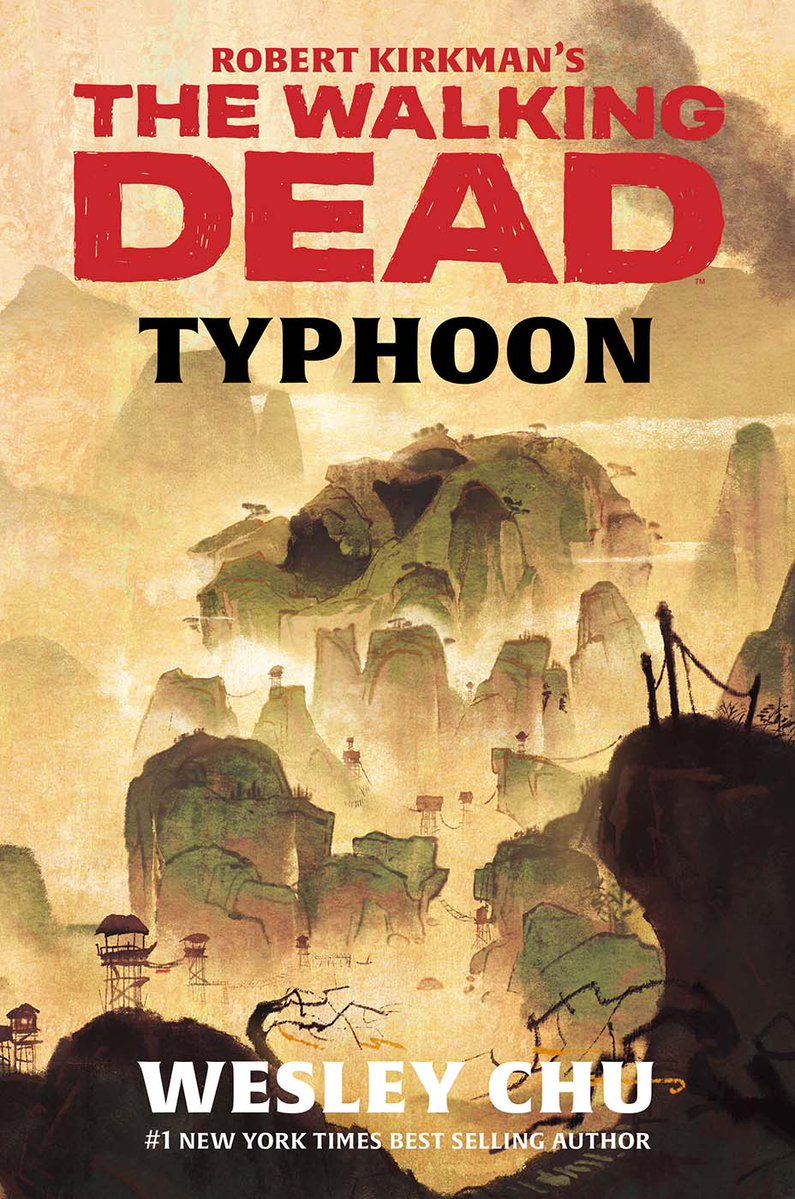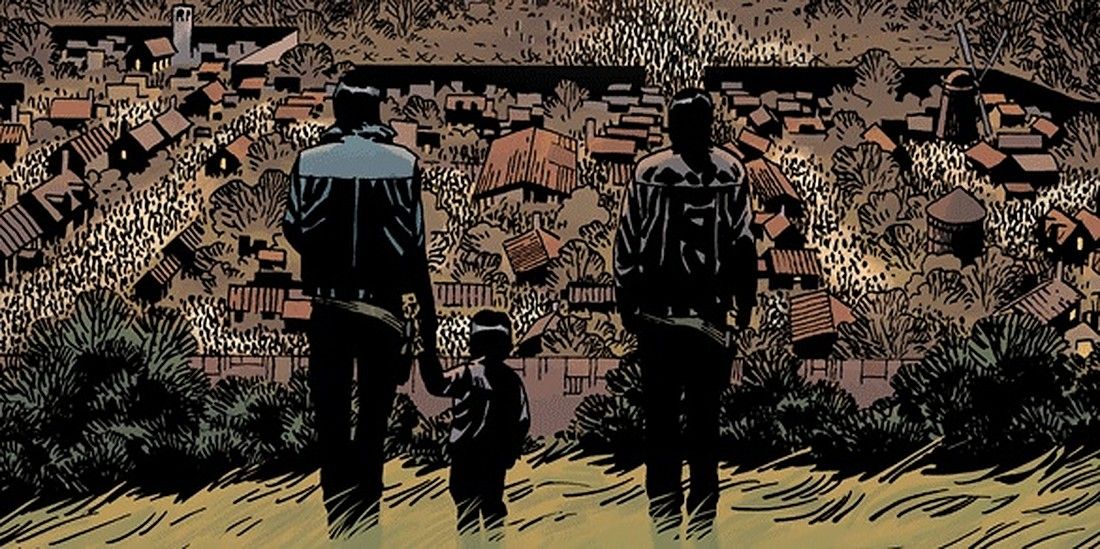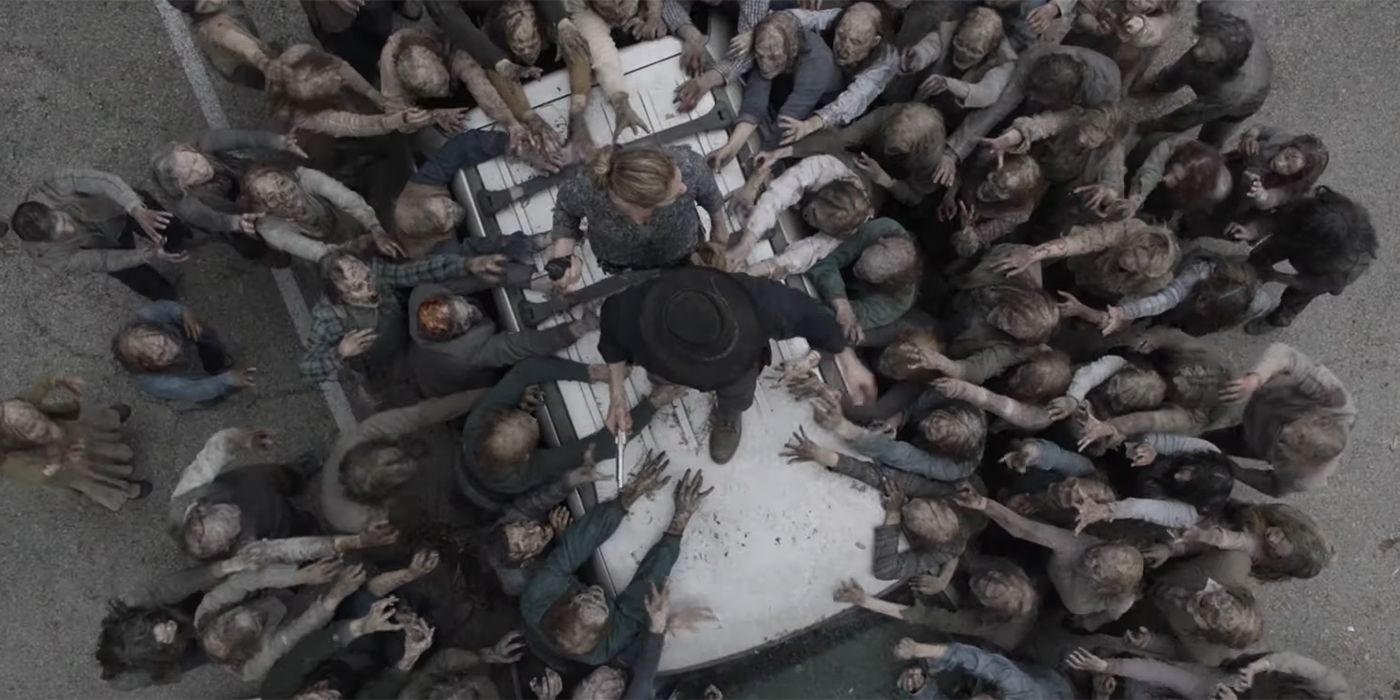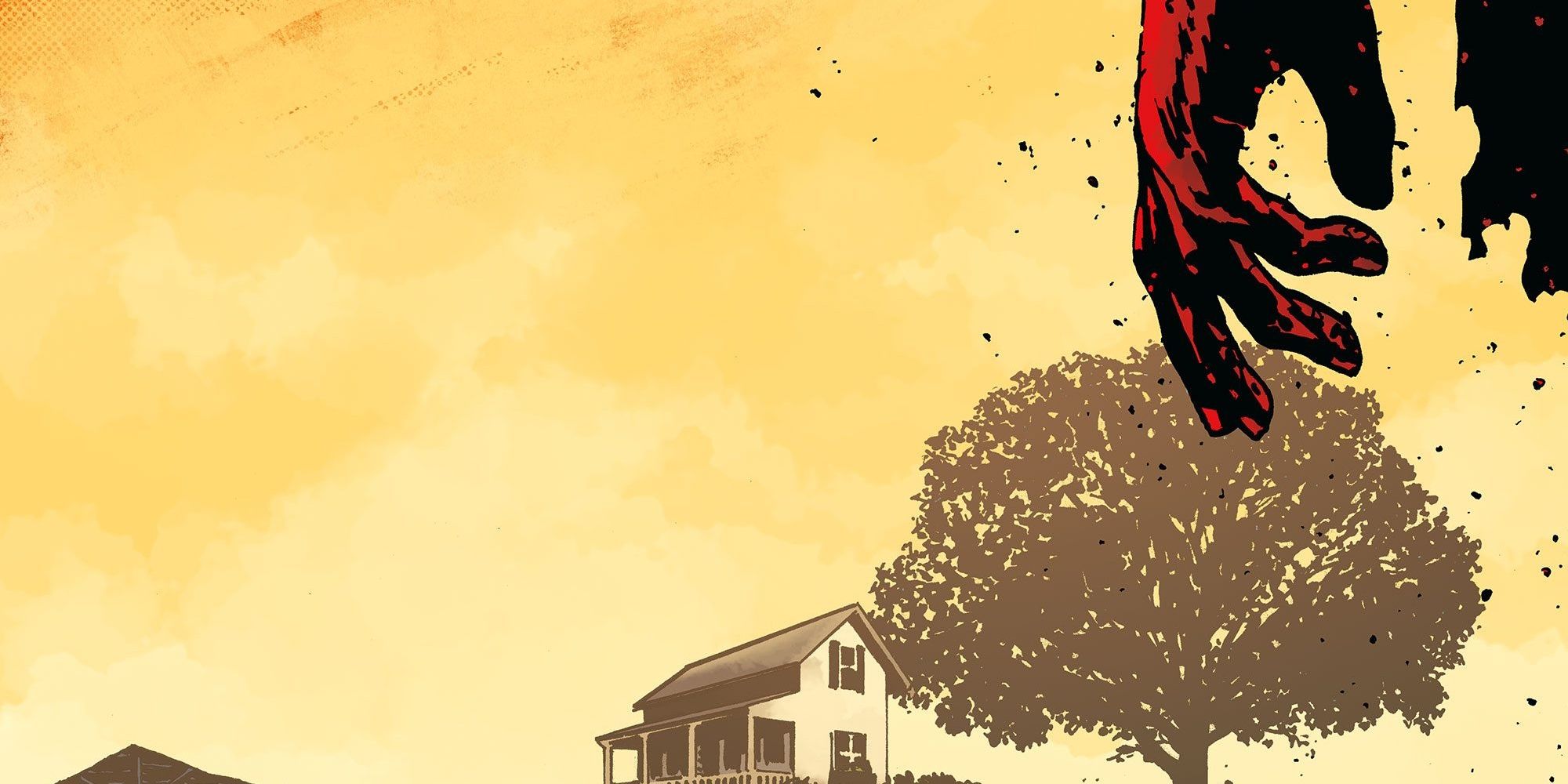For more than 15 years, The Walking Dead has thrilled fans across comic books, television series, video games and more, providing a window into a world that has descended into chaos and lawlessness in the face of a zombie apocalypse.
Created by Robert Kirkman and Tony Moore, the popular survival-horror franchise has taken place predominantly along the East Coast of the United States, with later television series and other media gradually showing the impact of the endless rise of the undead throughout the rest of North America.
In the latest expansion of the property, Robert Kirkman's The Walking Dead: Typhoon, New York Times-bestselling novelist Wesley Chu crafts an original story set within the mythos of the enduring horror universe providing the first-ever look at the zombie apocalypse's impact in China.
In an exclusive interview with CBR, Chu explains how the project came about, which elements of Chinese culture he wanted to highlight in the story, and more.
CBR: Wesley, you're writing the first Walking Dead story set in Asia, and specifically, a country with the biggest population in the world. How did this gig all come about?
Wesley Chu: The publishing industry is pretty small, everybody knows everybody else, and when it comes to science fiction/fantasy, it's an even smaller community. I'm friends with most of the other editors and novelists who work in my genre. There's always a couple guys you want to work with and it's a very short list: guys you haven't worked with, guys you've always heard good things about, great editors.
The editor for Skybound Books is Michael Braff and he's one of those guys on my shortlist that I always wanted to work with. I've worked with him a couple times and the relationship between the writer and editor is very important so you want to make sure you get along with them but also make sure they're a great editor; he fills both packages.
So we both happened to move to L.A. within the same time period and he gives me a call and says, "Hey, Wes, we got a project that we want you to do that we think you're uniquely qualified for. We want you to write a Walking Dead book set in Asia." And one of the great things that Skybound offered me was that they were going to give me the latitude on the story [I] wanted to tell, which is unusual for tie-ins. Most tie-in fiction they kind of lock you down a little bit; they want you to write the story they already had in mind. With Braff, he kind of gave me a decent leash on it.
At first I was like, "I write comedy and science fiction and my schedule is pretty packed for the next year or so." But right after that, I had a conversation with my agent and that night I started dreaming about it. My imagination went wild on the possibilities of what this story could be. Right off the bat, I started to think about the difference between the U.S. and China and how many more people there are, how many fewer guns there are, the geographical differences; all these things kind of came to me. And over the next week or so my agent was like, "You don't have time for this, you've just had a baby, you have this and that to do." And it became a thing for me where I thought about the story and what I could write for it and it kind of grew organically and finally I told my agent I want to do this project. Let's figure out how to make this happen and rearrange a few things to tell the story because it's going to be fucking cool.
What was it about Chinese culture being confronted with the rising of the undead that you found particularly interesting to explore?
I think one of the things that I found really, really interesting was what kind of how the government works. The Chinese government has more control, a bit more influence than, say, the United States or other countries in the world. So I wanted to lean in that a little bit, they have a very vibrant history, with the Cultural Revolution and aspects of that. So I wanted to and bring it the foreground a little bit, how a country that size with a government that strong reacts to a crisis that. At the end of the day, they might be able to rein certain parts of the crisis in but the zombies coming alive are a force of nature; you can't fight forces of nature.
With this story, it's still people trying to survive but there's an extra layer of how does the government react and how that relationship pans out with the conflict with the zombies.
In addition to all these native-born Chinese characters, you've got Elena Anderson, a character born and raised in Texas, who just happens to be in the Middle Kingdom when this all breaks out. What was your rationale and inspiration in including a Western character amongst the Chinese characters?
I thought coming from a writing standpoint that it was important that, with the book set for a Western audience, it was important to have a relationship where certain things can be explained to them when they needed it to. Really, China is a very international country, there's all these people going in; a lot of my friends have gone back to teach English as a second language there. So it would be unrealistic if there was just Chinese people there, there are a lot of different people who live out there so I wanted to show the diversity the country actually has.
What elements of Chinese culture were you happy to shine a light on that Western readers might not be familiar with?
One of the things I really enjoyed doing was showing the geography. China is such an old country. A few years ago I did a tour of Seattle and they were like, "Some of these buildings are two hundred years old!" In China, some of these villages are thousands of years old and some of the parts of that movie Avatar are based on the national park [the Precipitous Pillars] that's in the book. It's a beautiful country and it's so interesting just to walk through it so I really wanted to bring that aspect of China to the forefront.
Some things, like the jiangshi [an animated corpse from Chinese mythology that feeds off the life force of the living used by the characters, often to refer to walkers] are in the culture and I really wanted to bring in some Kung Fu because I'm a Kung Fu nut, I love Kung Fu. There are so many things I wanted to bring in to it that's just really cool. And on top of that, I really love interesting Chinese food. Chinese culture, Chinese food, the Cultural Revolution which I adjusted for this. If you ever read Mao Zedong's book, some of it is actually pretty progressive and ahead of its time in its philosophy and, obviously, very regressive in other parts. I wanted to bring that culture to the forefront.
This story follows a core trio and you had written this knowing they would face tough questions. In a way, would you say their troubles bristle against the Chinese concept of collectivism and authoritarian rule?
Somewhat, I mean, you're probably giving me a little more credit than I deserve [laughs]. I have the characters in mind and then let them grow organically and let them walk into their own conflict. So when it comes to characters like Hengyen, who is the company man and loyal soldier, I wanted him to rely on the pillar of this culture and what it ultimately betray him. With Elena, she's Western and a foreigner so she has some of a more Western attitude and I wanted her to be herself but, at the same time, embrace some of the Chinese culture that's influenced her. With Zhu, I wanted him to be between both worlds because he's loyal to China but he's also loyal to love.
But each of them, I wanted to put into a position where everything they know and love is tested.
You mentioned you previously came from a comedy and sci-fi background. How was it shifting gears into full-on horror, given the world it's in? How was it making that genre shift?
I would like to say there is a little comedy in this [laughs]! I think the great thing about thing about The Walking Dead is, at the end of the day, you watch the TV shows or read the comics or play the TellTale Games, The Walking Dead is about people. It's about people and their relationships with other people and how the strain of a force of nature like the dead rising affects them. That is a common theme you could do in any genre. So when it comes to writing this book specifically, I just took the characters and put them in a situation that needed to be created and kind of let them grow. In that aspect, it's not that different from writing a science fiction book or a thriller or comedy because as long as the reactions themselves and emotions are honest, it's just different shades of the same color.
Does that ever take you into surprising places as a storyteller; avenues you never expected to enter?
Oh, absolutely. One of the things that I do for every book I write is outline. For this, I wrote a 7,000 word outline that set me on a good path for the story. One of the coolest things about discovering this through character is that they sometimes make decisions that you didn't plan for. At a certain point, they want to go left when you want them to go right but then you know having them go left is the honest choice.
So what happens to me is when I start I have an outline and by the time I finish the book, I'm on outline 6.5 because these guys keep jumping off the rails so I have to go back and readjust.
Having said that, was the ending always what you kind of had in mind from your initial outline?
Actually no, because when I first submitted an outline to Michael Braff telling him how the story was going to go, he and Robert [Kirkman] went through it and they really approved of it. But what was different with this outline is that there were three different endings because it could go any way and I wanted to see where the characters are before they actually hit that ending. And they were like, "You know what? Let's see what happens."
And by the time I got there, I was like, "Let's not go with any of these endings, I want to go this way," because this is an honest reaction and it will have this impact on the characters and the reader. Mike read it and was like, "Change this, change that, and everything else is golden." And that's what happened. We wrote it in a way that really, kind of hit home. I like to think we got that one right.
I've been a big Walking Dead fan since the comics so this has been a dream come true and the fact that I get to play in this world and write about China... I'm really proud of this book and thankful to Robert for giving me this opportunity.
Robert Kirkman's The Walking Dead: Typhoon is written by Wesley Chu. It is scheduled to go on sale October 1 from Skybound Books and Gallery Books.

